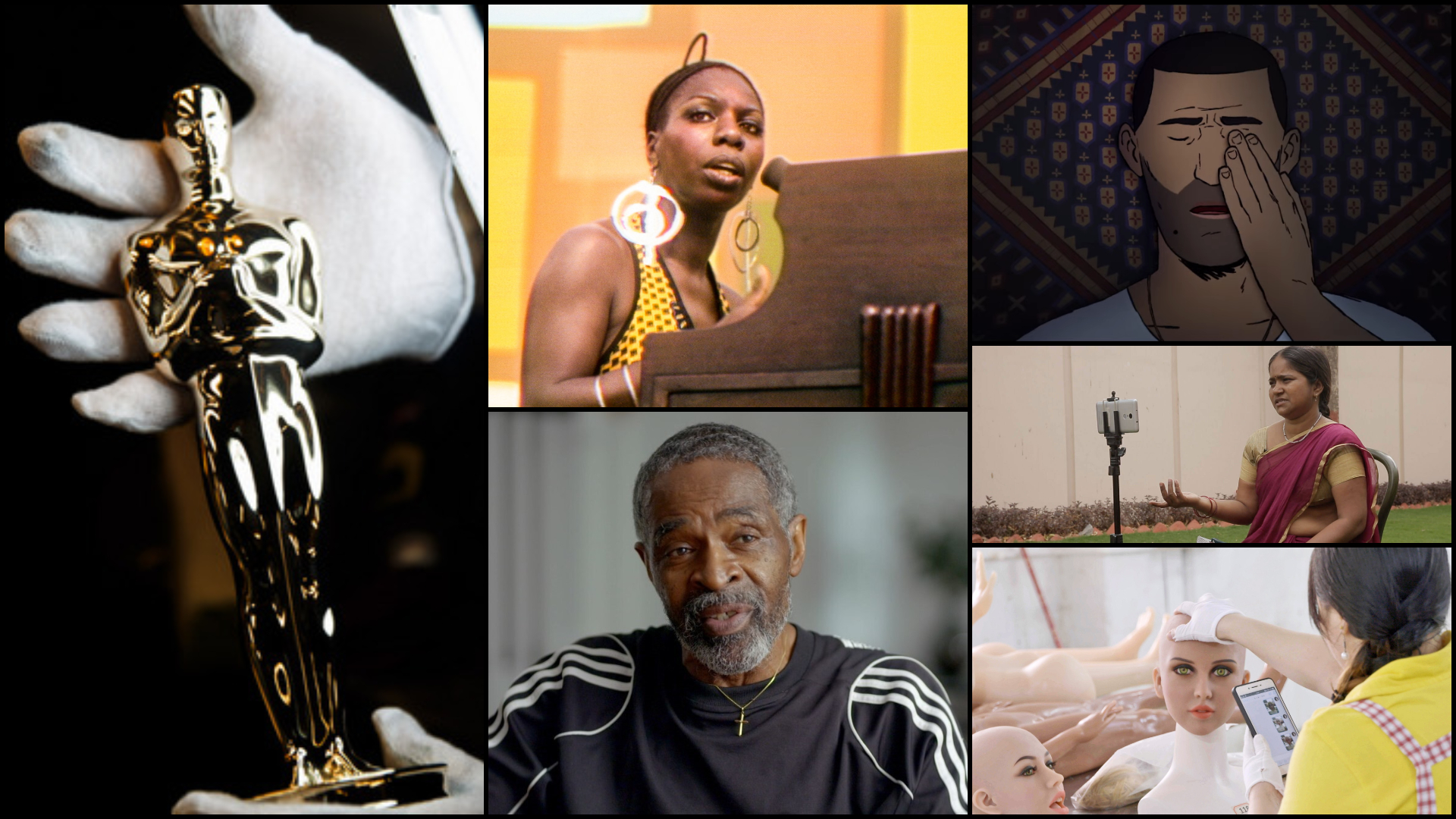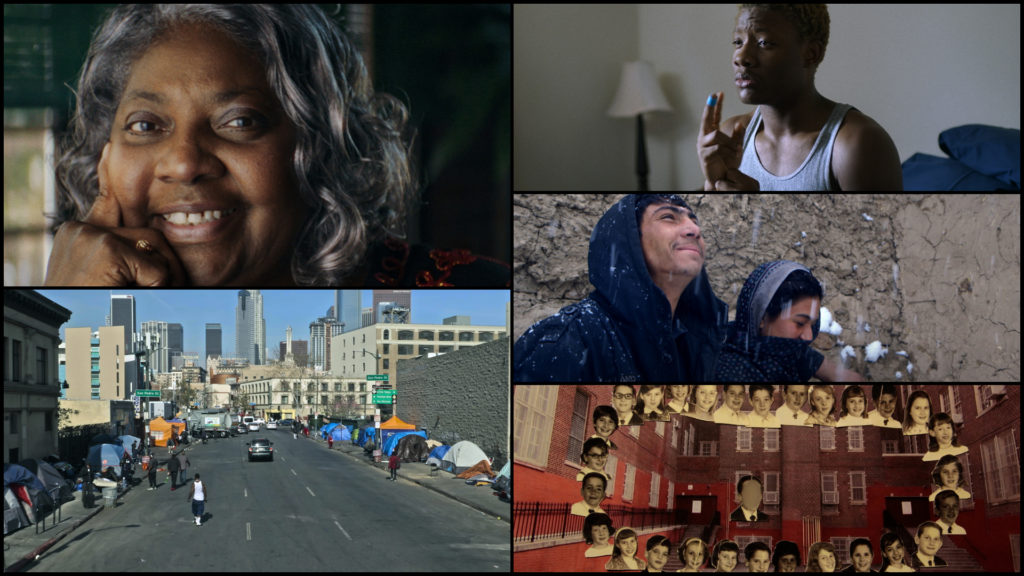It’s Oscar predictions time once again, Charlie Brown. The members of the embattled Academy have cast their ballots. Sunday’s much-dreaded song-and-dance show with infrequent shout-outs to the arts and crafts of filmmaking will reveal the winners.
The documentary race once again represents contenders that had the strongest legs since Sundance. Two of the nominees for Best Documentary Feature, Summer of Soul and Flee, got their starts on the festival’s opening night and won the jury prizes, as did Best Picture wild card CODA, while Writing with Fire was a sleeper hit at Park City. That’s quite impressive and offers proof that films can launch in a virtual environment if sales agents, publicists, and whomever actually let people see the movies. Festival buzz evidently goes a long way.
This year’s race, moreover, has been a two-horse mission between the Sundance champs. If Summer of Soul isn’t winning one prize, then Flee is usually adding to its tally. Don’t let their dominance of the race fool you though. The other three titles—Ascension, Attica, and Writing with Fire—could pull an upset for various reasons. Ascension has startling impact, while Attica gives overdue veteran Stanley Nelson his first nomination, and Writing with Fire captures the hearts of audiences. Similarly, pay no heed to the Academy’s decision to sideline the short docs to placate ABC and parent company Disney to make room for razzle-dazzle instead of airing all 23 categories live. The shorts are very strong and deserve the attention that the Academy Awards should offer.
Now that voting is officially closed, here are the films vying for Best Documentary Feature and Best Documentary (Short Subject) this year, along with POV’s picks and Oscar predictions. -PM
Best Documentary Feature
Let’s start with a look at the five nominees.
Ascension
It’s probably the long shot for the win, but expect further awards in Jessica Kingdon’s future. Her feature debut Ascension is a stunner. This film is a meditative, lyrical, and provocative work of the variety the Academy often ignores. It’s high art, but also a visually, emotionally, and intellectually compelling environmental parable. Furthermore, Kingdon creates exquisite long takes that observe the machinery of China’s manufactured dreams in motion. As the film chronicles the daily grind that churns out cheap and disposable products so that the wealthiest citizens of the world can enjoy further laps of luxury, Kingdon considers the fallacy of “the Chinese dream.” What chance is there for a future if we’re all sitting atop a mountain of trash?
While the multiplex has trash aplenty thanks to the Spider-men, Marvels, Eternals, and whomever else clogs the box office, the festival circuit has allowed docs like Ascension to thrive. Heading into the Oscars, Ascension has two wins from its Tribeca premiere—Best Documentary Feature and the Albert Maysles New Documentary Director Award—along with three wins from the Cinema Eye Honors including Outstanding Debut Feature. The film also scored nominations from the Directors Guild of America, Producers Guild of America, and Film Independent Spirit Awards. – PM
Ascension is available on video on demand and screens at Hot Docs Ted Rogers Cinema this weekend.
Attica
Stanley Nelson’s tough verité account of what happened when over 1000 prisoners took over the notorious Attica state penitentiary in upstate New York in September 1971 is a story with contemporary resonance. The hostility that the white prison guards and their conservative small-town families felt towards the mainly Black city-dwellers who made up the prison population is incisively evoked through interviews and newscasts from the time—and it’s still chilling to watch it today.
Using archival and contemporary footage to show the negotiations, the film builds suspense even though we know the denouement will leave over 40 people dead. Nelson and his colleague Traci A. Curry emphasize the tragedy through extraordinary footage shot at the time when the prisoners, desperate to make their quite reasonable demands– better medical treatment, fair visitation rights, religious freedom, and “an end of physical abuse, for basic necessities like toothbrushes and showers every day”—known to the public.
None of their requests happened. Instead Governor Nelson Rockefeller, a supposed liberal Republican, allowed the atrocious killings to take place, which included the New York State Police shooting wildly, effectively executing their own prison guards as well as the so-called rioters. Truly, Attica is a film for this moment when BLM (Black Lives Matter) is so important. It probably won’t win the Oscar but there certainly is a case to be made for giving it the prize. –MG
Attica is available on Crave (and streaming on YouTube for free from Showtime in the USA).
Flee
The documentary branch has never quite embraced a film like Flee. The relatively conservative non-fiction sector of the Academy often resists unconventional docs. Even the animated Waltz with Bashir couldn’t muster a doc nomination. Signs that the “stay in your lane” placards are dropping are evident in Flee’s unprecedented trifecta of nominations for documentary feature, animated feature, and international feature (as Denmark’s submission). This film by Jonas Poher Rasmussen harnesses the power of animation to tell the story of his friend, Amin Nawabi (a pseudonym) as he escaped the mujahedeen in Afghanistan, eventually landing in Denmark where he found himself continually on the run from his sexuality. This revelatory film simply would not exist without the perfect marriage of non-fiction storytelling and animation as Rasmussen uses a foundation of audio interviews complemented by imaginative, yet respectfully restrained images that tell Amin’s story authentically while preserving his anonymity.
The film premiered to wide acclaim at Sundance 2021 after the 2020 Cannes Film Festival for which it was selected never happened. Sundance was the right Launchpad for Flee as it won the Grand Jury Prize for World Cinema. Then came a string of industry plaudits including the Outstanding Achievement in Nonfiction Feature Filmmaking from the Cinema Eye Honors, European Film Awards for both documentary and animated feature, IDA Awards for Best Feature and Best, Best Feature at Annecy International Animated Film Festival, and Best Independent Feature from the Annie Awards, along with numerous critics’ circle gongs. It also scored the two most important endorsements of all: the top spots on both of POV’s top ten lists. It’s clear that Flee should be recognized from the Academy, but where? – PM
Flee is available on video on demand and screens at Hot Docs Ted Rogers Cinema this weekend.
Summer of Soul
Ahmir “Questlove” Thompson’s Summer of Soul (…Or, When the Revolution Could Not Be Televised) may have footage from more than 50 years ago but, it is the perfect film for the year and truly deserving of the Oscar. Already the winner of the Grand Jury prize and the Audience Award at the Sundance Festival, this encapsulation of the 1969 Harlem Cultural Festival, which attracted over 300,000 people during that long hot racially charged summer, continues to say a lot about the political and cultural realities in the U.S.A.
As expected, audiences responded to the wonderful music–the brilliant blues playing of B.B. King, the inflammatory jazz of Abbey Lincoln with Max Roach and the skilled moves and vocalizing of Gladys Knight & the Pips among others–but it isn’t just the music that makes Summer of Soul absolutely remarkable. The film is more than that: it captures the spirit of the Sixties politically and emotionally. 1969 marked the end of a decade that saw the assassinations of Malcolm X, the Kennedys, and Martin Luther King, Jr.. The Vietnam War was raging, with a high percentage of African American men fighting in an imperialist war for a government that had only recently given them their full civil rights. Riots had erupted in many American streets in 1968 after Martin Luther King’s murder and it’s likely that the Harlem Cultural Festival only got its funding in an attempt to pacify the most renowned Black community in America a year later.
Summer of Soul has been compared to Woodstock, which certainly helped the growth of hippiedom in the early Seventies. What would Summer of Soul have done to Black Power then? We’ll never know. But it’s great the film came out just when BLM was happening. And it would be lovely to see the movement capped by giving the Oscar either to Attica or, more likely, to the more celebratory Summer of Soul. –MG
Summer of Soul is available on Disney+, video on demand, and screens at Hot Docs Ted Rogers Cinema this weekend.
Writing with Fire
If voters love an underdog, then they’ll be smitten by Writing with Fire. This bona-fide crowd pleaser charms the pants off audiences everywhere it screens. Directed by Sushmit Ghosh and Rintu Thomas, the film won the Audience Award in the World Cinema competition at Sundance, along with a special prize for “Impact and Change.” Other accolades include an audience award at IDFA, plus similar honours at lower tier festivals and a handful of citations for social justice and courage. It’s hard to resist the film as Ghosh and Thomas follow the women behind Khabar Lahariya, the Indian newspaper run entirely by Dalit women. Writing with Fire observes as the journalists adapt to new technology, pivot to video, navigate sexism, and report on the rise of Hindu nationalism.
The doc crowd seems to love films about journalism, and only a cynic could deny the film’s mighty heart, but let’s be honest: Writing with Fire isn’t exactly Collective. It’s the slightest doc of the bunch. This nomination, moreover, proves that “story” still holds a lot of sway with the doc crowd. The subject matter is undeniably compelling, but purely on a level of filmmaking, Writing with Fire might struggle to win votes against stiff competition that found worthy subjects and elevated them through aesthetics. Unless, of course, members vote with their hearts. – PM
Writing with Fire is available on video on demand and screens at Hot Docs Ted Rogers Cinema on March 26.
Should win
Marc says: Although I’m totally sympathetic to Flee, I think that Summer of Soul should win. The Academy Awards may have global impact, but they are based in the U.S. and this film truly examines the racial divide in America while celebrating Black culture. Like Flee, it’s an artistic production and one with true resonance for Americans. So, it should win—and will win.
Pat says: Surprising nobody, I’m picking Flee. For me, this is the all-around #1 movie of 2021. It set the bar for the year and upheld it thanks to mix of innovation and vulnerability the filmmaker and subject bring to the tale.
Will win
Marc says: Summer of Soul. The music is great, and the politics is better. This is an important film—an audience pleaser—and a real winner.
Pat says: Summer of Soul. It’s a tough call, but I think Flee might fare better in the animation category since Summer of Soul is more in line with the Academy’s tendencies and can’t be rewarded elsewhere. Oscar loves a music doc, and Questlove’s film turns the genre up to 11! This archival doc truly is a wonder—any other year it might have received my vote and I won’t complain when it wins.
Should have been nominated
Marc says: I know that Pat is picking The Velvet Underground and I agree with that choice. But I’d like to make a case for another film that is brilliant and intensely moving: Roadrunner: A film about Anthony Bourdain. Morgan Neville, its director, has already won an Oscar for 20 Feet from Stardom and his talent shines through this unsettling and engaging look at the celebrity chef who took his own life four years ago. We see Bourdain’s immense talent as a journalist and chef and watch as his inherent romanticism lets him down in the end, plunging him into a suicide that hurt his friends and loved ones as well as his fans around the world. It’s a film that deserves prizes and should be a documentary staple.
Pat says: If Summer of Soul is winning the Oscar, then it’s flat-out nuts that Todd Haynes’ The Velvet Underground isn’t nominated. These are two of the best music docs in recent memory and for very different reasons. Summer of Soul has the wow factor of correcting history by mining the archives. Meanwhile, The Velvet Underground is far more sophisticated a work of art as an archival doc that offers an experimental collage of Andy Warhol gems layered with a wall-to-wall score and interviews. This category had room for both of them.
The Short Docs
The Oscar short docs screen at Hot Docs Ted Rogers Cinema on March 25 and are online where noted.
Audible: Matthew Ogens’ film is wonderfully stylish, giving us the sense of what it would be like to play football, and live your life, as a functioning deaf person. That the film with winning—in sports—and losing in life—through suicide—just makes it that much more consequential. –MG (on Netflix)
Lead Me Home: Directors Pedro Kos and Jon Shenk tackle America’s growing housing crisis in this effective slice of cinema verité that gives voice to the homeless in Los Angeles, San Francisco, and Seattle. Lead Me Home is tough thanks to its intimate perspective and epic scope. – PM (on Netflix)
The Queen of Basketball: Ben Proudfoot follows his nomination last year for A Concerto Is a Conversation with this irresistible portrait of Lucy Harris, who broke numerous barriers for women on the court. Her recent passing makes her infectiously giggly interview even more touching. – PM (New York Times)
Three Songs for Benazir: Netflix has three horses in the race with Audible, Lead Me Home, and Benazir. This doc by partners Gulistan and Elizabeth Mirzaei gets impressive access to an Afghan family living in a displacement camp outside Kabul, but is access enough to win? – PM (Netflix)
When We Were Bullies: Jay Rosenblatt is a brilliant film editor—just sayin’—and should win a career Oscar for that. His quirky film is wonderfully constructed with lots of amusing editing conceits, mainly playing with paper and photos of the past, but it does have an important story to tell about bullying as a child and potential life-long consequences. –MG (On Crave March 30)
Should win
Marc says: Lead Me Home is an empathic look at homeless people. It’s made with appropriate gravitas and decorum, giving the subjects their dignity and self-worth. The film is intensely moving and humanistic—and should win.
Pat says: It’s a very close call between Lead Me Home and The Queen of Basketball for me, but while the Queen made my heart flutter, Lead Me Home tapped me just right in both the heart and the head and gets my vote in a photo finish.
Will win
Marc says: Lead Me Home should win and will win. This is the kind of film that gets Oscars. I don’t always agree with the doc choice that is clearly on an essential topic but this one is—and it’s very emotional to boot.
Pat says: The Queen of Basketball. This ace character portrait checks all the boxes. How can you not love Lucy Harris? Besides, it’s high time the New York Times’ Op-Doc won this category and it’s exactly the kind of profile doc at which they excel. It’s sort of like a giggly, sassy If You Love this Planet, in a way.
Should have been there
Marc says: I know Pat has chosen Ain’t No Time for Women and, quite frankly, I agree with him. It’s charming and political and should have been nominated—and maybe even won.
Pat says: Of the films that won qualifying festivals, I was really rooting for the Canadian doc Ain’t No Time for Women by Sarra El-Abed. It won numerous festival prizes including top honours at Hot Docs and RIDM, as well as the FIPRESCI prize at Saguenay (where I served on the jury) for its verité observation of Tunisian women discussion the nation’s future on the eve of a pivotal election.
The Oscars air on CTV Sunday, March 27 at 8:00pm EST.














